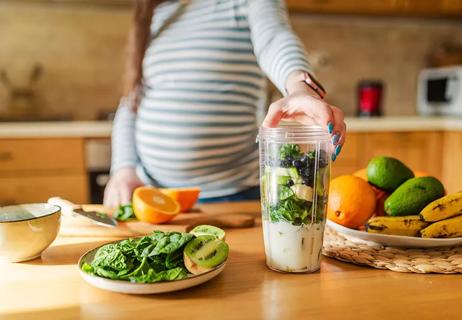Find out how clean eating can help you thrive during your pregnancy

As if expectant parents don’t have enough to worry about, add a type of diabetes that seems to be tailor-made for pregnancy. But if you’ve been diagnosed with gestational diabetes, take heart. Diabetes during pregnancy is very manageable — often without medication.
Advertisement
Cleveland Clinic is a non-profit academic medical center. Advertising on our site helps support our mission. We do not endorse non-Cleveland Clinic products or services. Policy
“Many people can manage the condition with a gestational diabetes diet and lifestyle changes,” says diabetes educator and registered nurse Megan Asterino-McGeean, BSN, RN, CDCES. “But if you do need medication, it’s not a sign of failure or that you did something wrong. Each pregnancy is unique and has its own needs.”
Asterino-McGeean teams up with registered dietitian Tegan Bissell, LDN, CDCES, to share the best tips, tricks and insights about following — and sticking to — a gestational diabetes diet plan.
Gestational diabetes is a type of diabetes that occurs during pregnancy. It usually develops when you are 24 to 32 weeks pregnant and disappears after delivery. But it’s possible to develop gestational diabetes before or after this time frame.
“Insulin’s job is to keep our blood sugar levels on target. But during pregnancy, your placenta makes hormones that prevent insulin from working as well as it should,” explains Asterino-McGeean. “High blood sugar levels can be dangerous, bringing possible risks and complications.”
Having gestational diabetes also increases your risk of having it again during future pregnancies.
Asterino-McGeean says anyone can develop gestational diabetes during pregnancy, but these factors increase your risk:
Advertisement
Consider a gestational diabetes diet plan your secret weapon to help prevent complications during pregnancy and delivery. Even if you need diabetes medication, Asterino-McGeean says it’s still vital to follow a gestational diabetes diet.
“Help keep blood sugar levels in check with a well-balanced diet. It should include lean sources of protein, plenty of non-starchy vegetables and correctly portioned complex carbohydrates,” she says.
Bissell notes that working with a dietitian can take the guesswork out of eating with gestational diabetes. “Your dietitian can help you set up balanced meals with the right amount of carbs to keep your blood sugars within the range your doctor recommends.”
Here’s a list of the best foods to eat on a gestational diabetes diet:
“These foods help you to feel full and are essential building blocks for fetal growth,” says Bissell. These include:
“It’s especially important to eat proteins at breakfast for more stable hunger levels throughout the day. Proteins can even help lessen morning sickness.”
These provide important vitamins, minerals and fiber, and you can consider them ‘freebie’ foods as they are very low in carbs,” Bissell says. These include:
Healthy fats help you feel full and are beneficial for heart health. They include:
We need carbs for energy, fiber and certain nutrients. Complex carbohydrates include:
If you are eating a gestational diabetes diet, avoid these foods:
Bissell recommends trying these five tips to get on the road to eating healthier:
Advertisement
Asterino-McGeean recommends keeping your doctor in the know as your pregnancy progresses.
“Continue with your scheduled appointments. Because your pregnancy is considered high risk if you have gestational diabetes, your obstetrician may also have you see a high-risk specialist for the remainder of your pregnancy,” she says.
Managing gestational diabetes is ultimately a team sport — and you are the quarterback. “Self-monitoring blood glucose levels at home is important for a healthy pregnancy,” adds Asterino-McGeean.
Here’s how to do it:
“The most important thing is preventing high blood sugar levels to keep you safe,” says Asterino-McGeean.
Advertisement

Sign up for our Health Essentials emails for expert guidance on nutrition, fitness, sleep, skin care and more.
Learn more about our editorial process.
Advertisement

Watch your diet, exercise regularly and get a blood glucose level screening early

Most antihistamines, like Zyrtec, are OK, but avoid decongestants for at least the first trimester

This diabetes medication can treat obesity, but it’s not for people who just want to drop a few pounds

Taking a smaller dose than what your doctor recommends isn’t a good idea

Hot, humid weather can affect your blood sugar levels and even cause dehydration or heat stroke

Ob/Gyns and midwives both care for your gynecological and pregnancy needs — which you choose depends on your health and comfort

One is a supplement, the other is a prescription medication — both may be useful in managing Type 2 diabetes, but one has more research

Vaginal bleeding, cramping and a decrease in pregnancy symptoms can be signs — but can have other causes, too

Even small moments of time outdoors can help reduce stress, boost mood and restore a sense of calm

A correct prescription helps your eyes see clearly — but as natural changes occur, you may need stronger or different eyeglasses

Both are medical emergencies, but they are very distinct events with different causes